Russia This Week is a weekly review by the MEMRI Russian Media Studies Project, covering the latest Russia-related news and analysis from media in Russia, the Caucasus, Central Asia, and Eastern Europe.
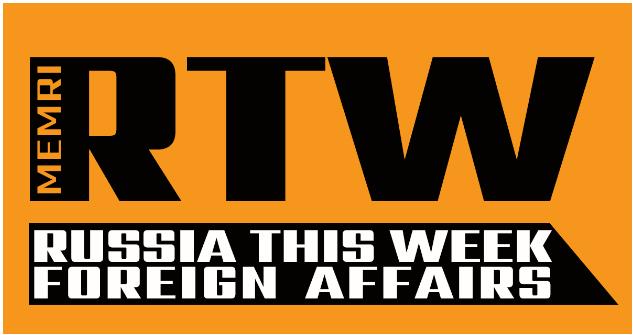
Cartoon Of The Week
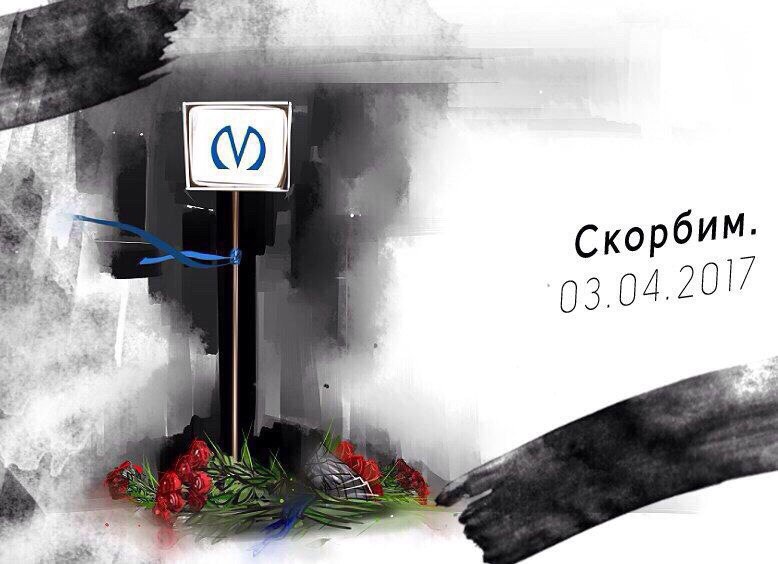
Vk.com/13studiya, April 3, 2017.
Caption: "We Mourn!"
On April 3, 2017, a bomb exploded in a subway car in St. Petersburg, killing 14 and injuring dozens.
The Weekly Lavrov
Russian Foreign Minister Sergey Lavrov made the following remarks during a March 23, 2017 lecture for senior officers of the General Staff's Military Academy:
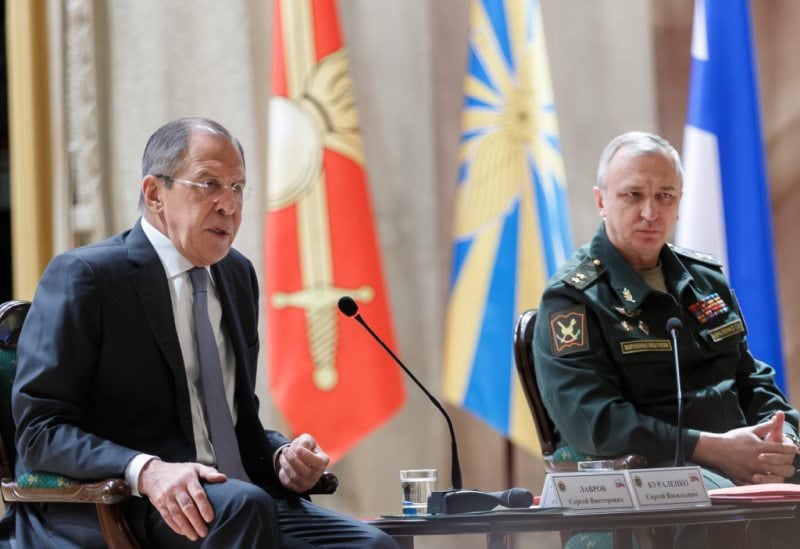
(Source: Mid.ru)
"I can say that the greatest misfortunes in the past centuries came to Russia almost always from the West, while Russia, according to Mikhail Lomonosov's famous dictum, 'expanded through Siberia,' bringing different peoples and lands in the East under its wing."
"Another hallmark associated with our vast Russian territory concerns respect for the state, which is the guarantor of the country's unity and the security of its citizens. A strong state also underpins an independent foreign policy. In international relations, all of that is embodied in the notion of sovereignty.
"The sovereignty of states, their equality as the main subjects of international relations, was substantiated and approved within the Westphalian system that took shape in Europe in the 17th century. Currently, these traditional notions are being questioned in a number of Western countries. They are trying to secure for themselves, for example, the ability to interfere in other people's affairs under the pretext of non-compliance with all sorts of unilaterally engineered human rights concepts like the so-called 'responsibility to protect.'"
"Healthy conservatism with regard to the inviolability of the stabilizing foundations of international law unites Russia with most countries of the world."
"Recently, the term 'soft power' has gained currency. However, this is power as well. In other words, the power factor in its broad sense is still important in international relations. Its role has even increased amid aggravated political, social, and economic contradictions and greater instability in the international political and economic system. We take full account of this fact in our foreign policy planning."
"Thanks to its advanced nuclear deterrent capabilities, Russia plays an important stabilizing role in global politics. At the same time, strategic stability for us is not confined to maintaining the nuclear balance between us and the United States."
"Recently, there has been a push towards forcing the nuclear states to abandon their nuclear arsenals and banning nuclear weapons altogether. It is crystal clear that this is premature."
"We are prepared to discuss the possibility of further gradual reductions in nuclear capabilities, but only if we take all the factors influencing strategic stability into account and not just the quantity of strategic offensive weapons."
"Whether some people like it or not, Russia remains the economic center of gravity for the post-Soviet countries. This objective factor, not Moscow's mythical urge to 'revive the empire,' underlies the movement toward Eurasian integration. We and our partners in the Eurasian Economic Union are linked in today's globalized world by centuries-long economic and cultural contacts and the intertwined destinies of our nations."
"Russia has its own experience with messianic fervor. Its current foreign policy is pragmatic, not ideological. Our country has its traditions and wholesome values, and we do not try to impose them on anyone. We warn our partners at the same time that when they are in Rome they should do as the Romans do."
"Resolving any pressing international issues without Russia became impossible."
"The distrust of Western democracies and the reluctance to interact with us on an equal footing doomed the attempts to create collective security in Europe in the 1930s, which resulted in the even greater destruction of World War II."
"In modern Europe, the roots of many problems can be seen in the irrational and doomed desire to sideline Russia, the Eurasian power. NATO and EU expansion has reached the point where Ukraine and other CIS countries were all but presented a false choice: either you are with Russia, or with Europe. Such an ultimatum was beyond the capacity of yet inherently unstable Ukrainian statehood. As a result, a major crisis in the heart of Europe broke out directly on the borders of Russia and the West."
"We do not see that our European partners are willing to work honestly in favor of creating a common security and cooperation space."
"In general, the European Union has been tangibly 'losing itself' recently. In fact, they are serving other people's interests, failing to find their own unified voice in foreign affairs. We are patient people, and we will wait for our colleagues to realize that due to a number of reasons – including historical, geopolitical, economic, and cultural – we, Russia and Europe, need each other."
"The formation of a polycentric international order is an objective process."
"History shows that betting on hegemony and one's own exceptionalism leads to greater instability and chaos."
"There is an objective, growing need for Russia-advanced approaches to key modern issues that are free of ideology and rooted in the principles of multilateralism and respect for international law. More and more countries are coming to share these approaches, which strengthens Russia's authority and its role as a balancing factor in world politics."
(Mid.ru, March 23, 2017)
In The News:
Iran-Russia Relations – Russian Expert: 'The Russian-Iranian Cooperation Program… Has A Measured, Frugal Character'
SUPPORT OUR WORK

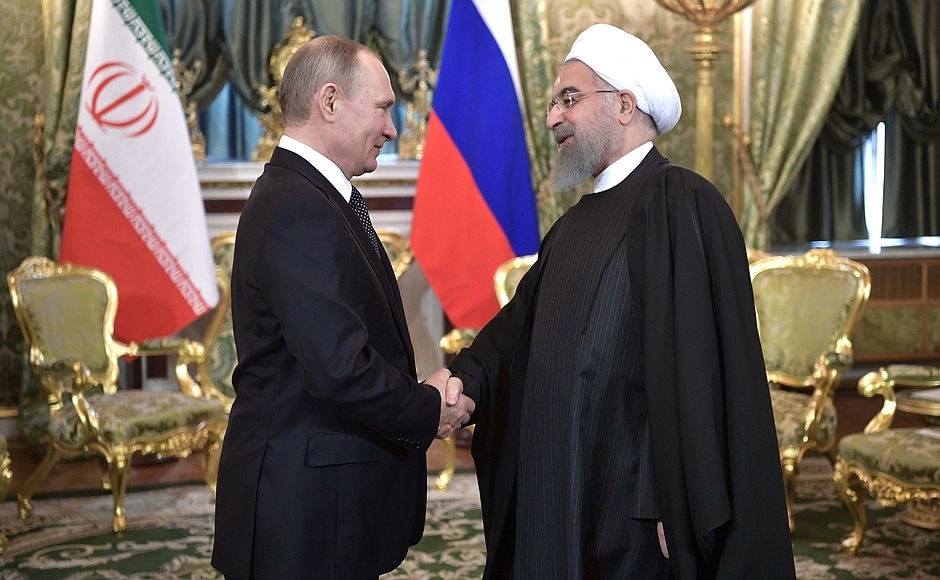
Putin with Rouhani (Source: Kremlin.ru)
On March 28, Iranian President Hassan Rouhani met with Russian President Vladimir Putin in Moscow. During the meeting, Putin stated that Iran is "a good neighbor and a reliable and stable partner for Russia."
In the official joint statement disseminated by the Kremlin the sides agreed on the following points:
- Iran-Russia cooperation is oriented towards reinforcing the central coordinating role of the UN in providing peace, security and viable progress. The application of unilateral sanctions against states is recognized to be illegitimate.
- The special attention was paid to the formation of a broad international coalition in order to fight terror. The coalition should act on the basis of international law, the UN charter, and respect the sovereignty of the countries directly injured by terrorist attacks without double standards.
- The sides insist on the necessity of worldwide countermeasures against the ideas of takfirism as they are the main stimulus driving the youth into terror organizations.
- Russia and Iran expressed their deep concern regarding the use of informational-communication technologies for criminal, terroristic and military purposes. The sides condemned any attempt to use force or the threat to use force in cyber dimension – i/e such actions as attack on Iran's computer infrastructure using Stuxnet program and any other technologies used for malicious purposes.
(Kremlin.ru, March 28, 2017)
Commenting on Rouhani's visit, Leonid Slutsky, head of the Russian Duma's international affairs committee, said: "Rouhani's visit to Russia shows that the relations between our countries are on the upswing both in the political and economic spheres. We consider Tehran a trustworthy partner".
(Ria.ru, March 28, 2017)
Professor Vladimir Sazhin, a senior research fellow of the Institute for Oriental Studies of the Russian Academy of Sciences: "When it comes to a possibility of using Iranian military airbases, the term 'depending on the concrete situation' means that Iran attempts to bargain with Russia for some future gains. Though we stand on the same side, there are some obstacles. I think that [Mohammad Javad] Zarif's words are a trial balloon. Earlier the Russian airforce used Hamadan airbase a couple of times – back then it caused quite dissatisfaction both in Tel Aviv and Washington. Moscow's problem is that Iran is criticized both by Israel, Saudi Arabia and other regional countries. Moreover, Iran does not enjoy particularly warm relations with Turkey. With some of these countries Russia has very warm relations and with some others simply friendly ones, thus we need to wage very complicated diplomatic attempts in order to solidify our successes with Iran and develop them, but simultaneously we should not provide a reason for other Middle Eastern countries to ruin the relations with us". Earlier, the Iranian minister of foreign affairs did not rule out the possibility for the Russian airforce to use Iranian military airfields again.
(Ria.ru, March 28, 2017)
Oleg Kulakov, professor at the Military University of the Russian Defense Ministry: "We don't know what price Iran will demand for letting us use the airfields."
Alexander Shumilin, head of the Middle East Conflicts Center at the Institute for U.S. and Canada Studies: "Moscow wants to keep Tehran in its sphere of influence… even if Iran tries to improve its relations with the West. The Iranian card may be played everywhere in the Middle East, for example, as an irritant in dealing with Gulf States or the Sunnis in general. Iran, for its part, plays the Russian card because for many years it has built a confrontation policy with the West. Tehran can't play against the West alone, it needs an ally like Russia even if this ally is not fully reliable."
(Vedomosti.ru, March 29, 2017)
Nina Mamedova, Chair of the Iran Section at the Institute of Oriental Studies of the Russian Academy of Sciences, wrote in the website of the Valdai Discussion Club: "One of the most important results of the meeting was the agreement to build two new blocks of the Bushehr nuclear power plant, which will become a factor in the growing trade of services.
"Many in Iran and Russia expected that bigger agreements would be made. In my opinion, these agreements were to a large extent supported by political interest. The rapprochement and standoff with the new U.S. presidential administration played a role as well.
"The Russian-Iranian cooperation program, as reflected in the signed documents, has a measured, frugal character. The joint statement focuses on common positions on the most relevant issues, rather than opposing other centers of power, which reflects the interests of both countries."
(Valdaiclub.com, March 30, 2017)
Russia-Turkey Relations - Tensions Over Grain Supplies
Russia's news agency Tass reported: "Turkey excluded Russia from the list of countries free of duties for imports of agricultural products starting March 15. Now, Russia and some other countries are not on the list of states with duty-free imports that can deliver commodities for further processing and export free of payment of the duty amounting to 130%. Previously Russian exporters and their Turkish customers imported grain meant for processing and further export with zero duty, while they still had to pay a 130% duty in order to sell products locally. Turkey is Russia's second-biggest grain importer in volume terms after Egypt."
(Tass.com, March 21)
The Russian business daily Vedomosti reported that, if Turkey proceeds with the ban, Russia will have to lower prices, which will affect international and local prices and incomes, thus damaging the manufacturers and exporters. This happened a week after president Erdogan visited Moscow and declared that the countries had overcome the political and economic difficulties.
(Vedomosti.ru, March 17, 2017)
See MEMRI Special Report No. 6835, Russia This Week – March 14-19, 2017, March 21, 2017
Russian news agencies reported that, following a request from Turkey, the Russian authorities have suggested meeting in Moscow to discuss the situation with grain suppliers from Russia. Deputy Prime Minister Arkady Dvorkovich said: "We have received a letter from our counterparts, where they suggested meeting up to discuss the topic… We have invited them to visit us. Now we are expecting a confirmation of the actual date."
(Rbth.com, April 1, 2017)
Russia's Deputy Agriculture Minister Sergei Levin said: "Our closest neighbor, Turkey, has built up a strong milling industry subsidized by the government, which tapped almost all the Arab and Asian markets that it could, on the base of our grain, blatantly violating all WTO rules [against government subsidies]."
(Tass.com, March 21, 2017)
The Kremlin on his part made an effort to downplay the crisis. Kremlin spokesman Dmitry Peskov said: "The grain market is not limited to Turkey alone. It is large, quite stable and autonomous part of the global market. The closure of some segments on this market means that some quantities will flow into other segments." He added that "this is a normal economic process." Peskov also said that "the Agriculture Ministry is working intensively to protect the interests of Russia farmers."
(Tass.com, March 21, 2017)
On March 20, the Russian daily Vedomosti published an op-ed by journalists Pavel Aptekar and Nikolai Epple, titled "Patriotic Projects and Vegetables" on Turkish-Russian relations and on why similar autocratic regimes can't get along. Below are excerpts of the article:
"All happy autocrats are alike. But they can't get along with each other.
"Vladimir Putin and Recep Erdogan are often compared; people find many similarities in their biographies, in their style of government, and in their political aspirations. They are both charismatic, have ruled for a long time, and are determined to strengthen their regime of personal authority even more by squashing the opposition. The news constantly bring new confirmations of their similarity. Turkey has just accused Germany of supporting the organizers of the attempted coup-d'état in Ankara in July 2016. (Russia, in turn, regularly accuses the U.S. of financing the opposition and participating in the change of power in Ukraine). One of the consequences of the failed coup was the referendum on constitutional amendments scheduled for April 16; these amendments provide for converting Turkey from a parliamentary republic into a presidential one.
"As Seyla Benhabib, a Turkish-born professor at Yale University, writes in The Washington Post, changes will mean drifting towards authoritarianism 'in the model of Kazakhstan or Russia.'
"In preparing for the referendum, the Turkish authorities tried to organize rallies for Turkish communities in the European countries (rallies were forbidden in Germany, the Netherlands, Austria and Switzerland, which provoked another crisis in relations) – this is slightly similar to the Russian policy of 'building the Russian world' and the rhetoric of 'reuniting the largest divided nation.' Erdogan even urged the expatriates to have five children in a family, secure a foothold in Europe, and become its future.
"Russia has important trade relations with Turkey, and it looks like friendship is a must in the context of fighting 'the enemy from without.' But it's much easier to get along without the specter of any enemy at all.
"Mutual trade, tourism, and energy cooperation developed smoothly before the start of 'patriotic' projects in Russia and Turkey. But the Cold War of a new type (without two power centers) has other demands, it does not suffer concessions. The sudden quarrel because of the downed Su-24 ended with a no less sudden reconciliation between Moscow and Ankara. Both were the result of political circumstances: 'being friends against the West' does not mean getting along with each other.
"Economic processes develop at completely different speed and on different grounds. Russia does not cancel all its embargoes introduced during the quarrel (for example, the vegetable embargo); Turkey reacts by introducing or threatening to introduce its own (for example, the wheat embargo). The embargoes have their own bureaucratic logic and lobbying groups. The losses are not so great, by the way: in 2015, Turkey's trade with the EU represented 44.2% of its turnover, while with Russia it was 6.6%. Turkey's share in the Russian trade turnover was 4.4% in 2015.
"In addition, it turns out that both nations, freshly 'raised from their knees,' are quite incapable of making concessions to each other on sensitive political issues. On the third anniversary of Crimea's incorporation into Russia, the Turkish Ministry of Foreign Affairs yet again officially called it an annexation and a gross violation of international law. Russia's and Turkey's interests in the Syrian conflict differ as well – on the issues of supporting Bashar al-Assad, the Kurds, Turkomen, or the configuration of the future political order. Ironically, another impediment to the friendship of the two rulers is the third one – Assad."
(Vedomosti.ru, March 20, 2017)
Russia in Syria
The Russian news agency RIA published videos taken by the eyewitnesses in the Afrin area, in Syria. The videos features the arrival of Russian forces.
(Ria.ru, March 20, 2017)
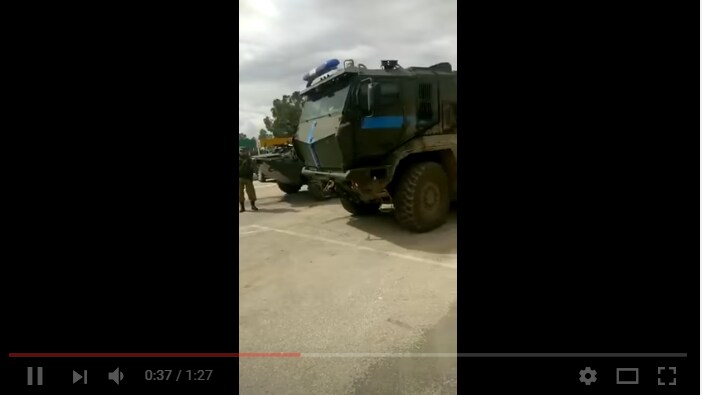
See Video

See Video




